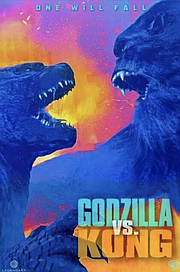Honor the ‘small’ 2020 movie year
With more and more money committed to home entertainment, movie theaters increasingly rely on big budget, studio blockbusters in order to stay afloat. Then the pandemic decimated the 2020 release calendar.
Even after the vaccine becomes widely available, recent news may suggest that the movie industry will never go back to the way things were before.
Case in point, Disney’s announced creative restructuring that prioritizes content development for their Disney Plus streaming service. It’s the reason why Pixar’s highly-anticipated “Soul” will debut there on Christmas Day, and also why their massively successful series, “The Mandalorian” is just the first of many “Star Wars” projects to be delivered directly to consumers in the near future.
Last week, an even bigger bomb dropped. Warner Bros. announced that its entire theatrical slate for 2021 would be released in theaters and on the HBO Max streaming service at the same time. Subscribers will be able to see major 2021 blockbusters like “Godzilla vs. Kong,” “The Suicide Squad” sequel and “The Matrix 4” from the comfort of their own couch at no additional cost. This program will technically start this month with “Wonder Woman 1984” going to both theaters and HBO Max on Christmas Day.
Warner Bros. insisted the HBO Max play is a temporary move. The vaccination process in the United States will likely mean theaters won’t be able to have full-capacity screenings for several more months. However, the massive successes of Netflix and Disney Plus this year proves that an ongoing subscription service can be more directly profitable to the studios, especially if theater attendance lags deep into the next year.
If this “temporary” move allows HBO Max to significantly grow its subscriber base in 2021, it probably shouldn’t be assumed they’ll just revert back to the old release strategy in 2022.
Will this continued shift to streaming platforms further endanger the financial stability of theaters? Absolutely, but it’s also going to tempt streaming companies into further prioritizing big, eye-catching projects over the smaller films that have been dominating there in recent years. Will Netflix continue to spend millions on distinct-if-not-commercial visions from filmmakers like Alfonso Cuaron (“Roma”), Charlie Kaufman (“I’m Thinking of Ending Things”), Noah Baumbach (“Marriage Story”) and Spike Lee (“Da 5 Bloods”), or will they pivot in order to compete with the “Wonder Womans” and “Godzillas” of the streaming world? Time will tell.
For this reason, I consider it especially vital for the movie industry and the Oscars specifically to celebrate the “scaled-down” movie year that’s been 2020. When most big movies bailed on 2020, we filled our entertainment quota with a slate of smaller projects released on streaming and video-on-demand. As a result, many Top 10 lists this year will be more “independently” focused than usual (though us snobby critics always love championing small movies and dumping on the blockbusters).
Meanwhile, the Academy opted to push this year’s Oscar eligibility window to the end of February, allowing studios a chance to include more movies in the 2020 awards conversation. The decision hinged on an assumption that the U.S. wouldn’t be as inundated with COVID compared to the summer and therefore more theaters would be open. That hasn’t happened, and as a result, not much new has been added to the calendar in January and February 2021.
The Oscars don’t need the padding, as there’s been more than enough quality films in 2020 to fill the nomination slate. I hope that Academy voters prioritize the year’s quality work over those few Hollywood wannabes that stuck to their original release dates in order to take advantage of the diminished competition (I’m looking at you, “Hillbilly Elegy”).
At a time when the industry is being forced into betting more and more on mass-appeal projects, there needs to be a dedicated effort to spotlight independent filmmakers and those who tell distinct, original stories.
As much as I appreciate early year blockbusters like “Birds of Prey” and “The Invisible Man” (and Christopher Nolan’s attempt to provide a giant theatrical experience this summer with “Tenet”), those movies don’t define the 2020 movie year for me. The movies I’ll remember are the intimate ones I saw at home - things like “Never Rarely Sometimes Always,” “Palm Springs,” “Nomadland” (via a virtual film festival), “First Cow,” “I’m Thinking of Ending Things” and Steve McQueen’s “Small Axe” anthology.
Maybe a “Soul” or an “Invisible Man” will crack my Top 10 too, but the lesson from 2020 should be that small movies still deserve a place in the post-COVID movie landscape, even as studios try to capitalize on our growing comfort with consuming things at home.
And if the streaming services eventually become the place for mainstream content, maybe movie theaters can survive by shepherding a new era of art house cinema.
• • •
Tyler Wilson has been writing about movies for Inland Northwest publications since 2000. He is the co-host of “Old Millennials Remember Movies,” available everywhere you get podcasts. He can be reached at twilson@cdapress.com.





